
What’s in the cliffhanger deal struck by Biden and McCarthy to raise the debt limit?
Weeks of sniping back-and-forth between the White House and the Republican majority in the House of Representatives has finally yielded a deal: America will not default on its debt obligations, should Congress act and pass the legislation before Thursday. On Saturday, House Speaker Kevin McCarthy and Joe Biden announced the end of negotiations and the agreement upon a deal late into the evening, with the text of the legislation itself soon to follow. The new compromise both touches on Republican priorities while also safeguarding Joe Biden’s legislative accomplishments. But it comes after weeks of bitter fighting. Republicans accused the White House and congressional Democrats of out-of-control spending, ignoring their rivals’s derisive reminders about the debt incurred by a GOP-led tax cut passed in 2017 that largely benefited wealthier Americans. Democrats, meanwhile, blamed Republicans for holding the country’s credit rating and ability to pay its loans hostage, and for seeking cuts to social welfare programs like food assistance for needy families. As we inch closer to Thursday’s deadline, let’s take a look at what leaders in Washington have come up with to break the deadlock. No more debt drama (for now) The first and most significant achievement of this deal: it raises the debt ceiling through the end of 2024. That guarantees the GOP won’t be able to wage a fight over the issue again, particularly as the presidential campaign season heats up later this year and into the next. Any debt ceiling battle during campaign season, particularly in the summer or fall of 2024, would take Joe Biden off the campaign trail and put his focus firmly on Washington at a time when either of his likely general election opponents, Donald Trump and Ron DeSantis, would be free to continue their politicking. In total, the deal calls for raising America’s debt limit by $4 trillion. Signing away that leverage for the next year is already proving to be one of the toughest pills for congressional conservatives in both the House and Senate to swallow, especially given the lack of other major concessions in the pending legislation. Spending caps The GOP’s big win in the negotiating process, this legislation is set to freeze federal spending at the current level, with the exception of military funding, through 2024. And growth of that spending will be capped at 1 per cent if Congress cannot agree upon a stopgap spending deal in January of 2025. This is a significant restriction for the federal government over the next year, and notably puts in place much stricter spending limits than members of Congress agreed to during the last debt limit fight in 2019. The language allowing for defence spending to increase while domestic programmes face a spending freeze is already irking progressives, who have long argued that the US military’s bloated budget should be at the top of the list for reforms. Caps set by this compromise are simultaneously the biggest victory for Republicans as well as their failure; while the spending caps are certainly more than what Democrats were demanding, they also eliminate the possibility of Republicans using the debt ceiling to make real cuts to programmes already implemented by the Biden administration as part of the Inflation Reduction Act and other legislation. That means that Mr Biden’s 2021-2022 legislative agenda will remain largely intact, despite demands by conservatives to roll back huge parts of it, like efforts to forgive student loans or expand green energy production. Work requirements for food stamps One of the GOP’s efforts to stem the tide of federal spending is centred around the issue of providing food assistance to low-income families. The new legislation is set to expand work requirements for the SNAP programme from the current age cap of 49 to a new cap of 54, meaning that Americans within that age bracket will have to prove employment to receive benefits. The issue may seem oddly specific for Republicans to hold up America’s ability to pay its debts upon, but tightening the restrictions fo federal assistance has long been a target of the GOP, and originally the party wanted to expand those work requirements to Medicaid as well. The new work requirements will sunset in 2030, unless extended before then by a GOP Congress. IRS funding halted The other specific ask that Republicans managed to secure in their compromise with the White House was a halt, at least in part, to a plan to fund new hiring initiatives at the Internal Revenue Service (IRS), America’s tax collection agency. The beleaguered agency was set to receive more funding for agents that the federal government said were to assist taxpayers with filing issues and shore up the IRS’s capabilities; Republicans painted the issue instead as an effort to hire an army of IRS auditors to go after taxpayers for suspected fraud, a non-starter for the party that has long sought, particularly among its conservative wing, to diminish the power and capabilities of both the IRS and other federal agencies. But some conservatives are already complaining that the cuts aren’t enough. Congressman Chip Roy exclaimed angrily after the deal was announced that “98%” of the funding for the expansion of the IRS’s services would still go through. Covid aid The deal has one more minor win for Republicans — a provision to return Covid aid funding that has yet to be appropriated. Millions of dollars in this aid still remains unspent by the federal government, though Democrats have used it thus far to fund a number of federal health programmes which they warn could face cuts if the aid is rolled back entirely. Read More Debt ceiling agreement gets thumbs up from biz groups, jeers from some on political right President attends 2nd grandchild's graduation as daughter of Biden's late son leaves high school Democrats look set to back debt limit deal – while right-wing threatens to blow it up AP News Digest 8:40 a.m. Debt-ceiling deal: What's in and what's out of the agreement to avert US default Asylum-seekers say joy over end of Title 42 turns to anguish induced by new US rules
2023-05-29 05:46
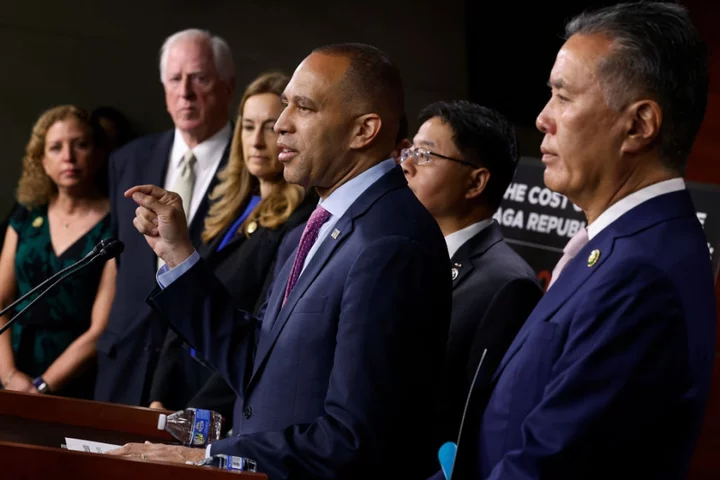
Democrats look set to back 11th hour debt ceiling deal – while GOP right-wingers threaten to blow it up
House Speaker Hakeem Jeffries sounded confident that Congress would vote to avert a default on the US’s obligations on Sunday, hours after news broke that the White House had reached a deal with Republican leadership to raise the debt ceiling. The “agreement in principle” was announced Saturday evening after much of the House of Representatives and Senate had left for the Memorial Day weekend. A handful remained in Washington to continue negotiations ahead of the deadline; the US Treasure Department estimates that the federal government’s ability to pay its debts will be in question come 1 June — this Thursday. Mr Jeffries spoke on CBS’s Face the Nation on Sunday. While he cautioned that he had not seen the actual text of the bill, which is reportedly set to cap funding for the US government (except for the military) through 2024, he offered a simple “yes” when asked directly if he could guarantee that the US would avert default. It’s a statement that will likely mean a sigh of relief for those Americans worried about the effects that a credit downgrade would have on the US economy, though that remains a possibility thanks to the toxic partisanship that brought the US to this point in the first place, but also one that may frustrate progressives and other Democrats who may see the development as Democrats giving in to the GOP’s demands. The deal does stave off further debt ceiling negotiations until 2025, but many on the left simply wish to do away with the limit altogether. And there’s already signs that many on the conservative right do not like the deal, with some even calling any legislation that raises the debt limit a non-starter. Their opposition within the GOP’s slim House majority necessitates votes from Democrats to pass this deal or any other. More follows...
2023-05-28 23:49
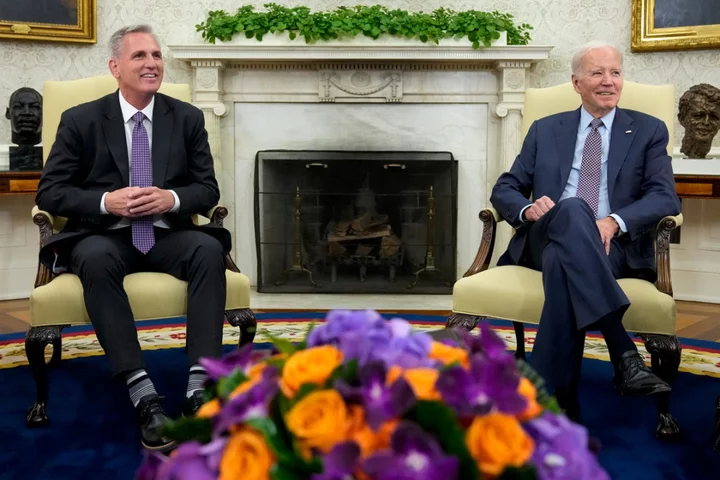
Debt ceiling deal reached between Biden and McCarthy
President Joe Biden and House Speaker Kevin McCarthy have reached a tentative agreement to avert a catastrophic and unprecedented default on America’s sovereign debt, ending a monthlong standoff that threatened the US and global economies. The White House said Mr Biden and Mr McCarthy spoke by phone for roughly 90 minutes late Saturday. The president also spoke with Democratic congressional leaders as the talks between the White House and the Republicans who control the House of Representatives entered final stages after days of back-and-forth over GOP demands to add work requirements for food assistance and other programs meant to help lower-income Americans. One source familiar with the matter described the president and the House Speaker as having come to an “agreement in principle” that would limit federal spending while raising the nation’s statutory debt limit by an amount large enough to keep the issue off the table through the November 2024 general election. More follows...
2023-05-28 09:27
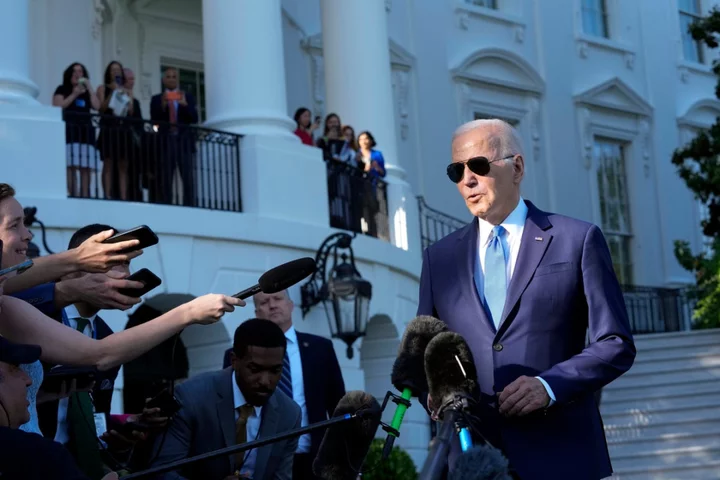
Biden says debt deal 'very close' even as two sides far apart on work requirements
Work requirements for federal food aid recipients have emerged as a final sticking point in negotiations over the looming debt crisis, even as President Joe Biden said Friday that a deal is “very close.” Biden’s optimism came as the deadline for a potentially catastrophic default was pushed back to June 5 and seemed likely to drag negotiations between the White House and Republicans over raising the debt ceiling into another frustrating week. Both sides have suggested one of the main holdups is a GOP effort to boost work requirements for recipients of food stamps and other federal aid programs, a longtime Republican goal Democrats have strenuously opposed. Even as they came closer to a framework on spending, each side seemed dug in on the work requirements. White House spokesman Andrew Bates called the GOP proposals “cruel and senseless” and said Biden and Democrats would stand against them. Louisiana Rep. Garret Graves, one of House Speaker Kevin McCarthy’s negotiators, was blunt when asked if Republicans might relent on the issue: "Hell no, not a chance,” he said. The later “ X-date,” laid out in a letter from Treasury Secretary Janet Yellen, set the risk of a devastating default four days beyond an earlier estimate. Still, Americans and the world uneasily watched the negotiating brinkmanship that could throw the U.S. economy into chaos and sap world confidence in the nation’s leadership. Yet Biden was upbeat as he left for the Memorial Day weekend at Camp David, declaring, “It’s very close, and I’m optimistic.” With Republicans at the Capitol talking with Biden’s team at the White House, the president said: “There’s a negotiation going on. I’m hopeful we’ll know by tonight whether we’re going to be able to have a deal.” But a deal had not come together when McCarthy left the Capitol Friday evening. In a blunt warning, Yellen said failure to act by the new date would “cause severe hardship to American families, harm our global leadership position and raise questions about our ability to defend our national security interests.” Anxious retirees and others were already making contingency plans for missed checks, with the next Social Security payments due next week. Biden and Republican McCarthy have seemed to be narrowing on a two-year budget-slashing deal that would also extend the debt limit into 2025 past the next presidential election. But talks over the proposed work requirements for recipients of Medicaid, food stamps and other aid programs seemed at a standstill Friday afternoon. Biden has said the Medicaid work requirements would be a nonstarter. But he initially seemed open to possible changes on food stamps, now known as the Supplemental Nutrition Assistance Program, or SNAP. The Republican proposal would save $11 billion over 10 years by raising the maximum age for existing standards that require able-bodied adults who do not live with dependents to work or attend training programs. While current law applies those standards to recipients under the age of 50, the House bill would raise the age to include adults 55 and under. The GOP proposal would also decrease the number of exemptions that states can grant to some recipients subject to those requirements. Biden's position on the SNAP work requirements appeared to have hardened by Friday, when spokesman Bates said House Republicans are threatening to trigger an unprecedented recession “unless they can take food out of the mouths of hungry Americans.” Any deal would need to be a political compromise, with support from both Democrats and Republicans to pass the divided Congress. Failure to lift the borrowing limit, now $31 trillion, to pay the nation’s incurred bills, would send shockwaves through the U.S. and global economy. But many of the hard-right Trump-aligned Republicans in Congress have long been skeptical of Treasury’s projections, and they are pressing McCarthy to hold out. As talks pushed into another late night, one of the negotiators, Rep. Patrick McHenry, R-N.C., called Biden’s comments “a hopeful sign.” But he also cautioned that there’s still “sticky points” impeding a final agreement. While the contours of the deal have been taking shape to cut spending for 2024 and impose a 1% cap on spending growth for 2025, the two sides remain stuck on various provisions. House Republicans had pushed the issue to the brink, displaying risky political bravado in leaving town for the Memorial Day holiday. Lawmakers are tentatively not expected back at work until Tuesday, but now their return is uncertain. Weeks of negotiations between Republicans and the White House have failed to produce a deal — in part because the Biden administration resisted negotiating with McCarthy over the debt limit, arguing that the country’s full faith and credit should not be used as leverage to extract other partisan priorities. “We have to spend less than we spent last year. That is the starting point,” said McCarthy. One idea is to set the topline budget numbers but then add a “snap-back” provision to enforce cuts if Congress is unable during its annual appropriations process to meet the new goals. Lawmakers are all but certain to claw back some $30 billion in unspent COVID-19 funds now that the pandemic emergency has officially been lifted. McCarthy has promised lawmakers he will abide by the rule to post any bill for 72 hours before voting. The Democratic-held Senate has vowed to move quickly to send the package to Biden’s desk. ___ Associated Press writers Mary Clare Jalonick, Stephen Groves, Farnoush Amiri, Seung Min Kim and Kevin Freking and videojournalist Rick Gentilo contributed to this report. Read More Ukraine war’s heaviest fight rages in east - follow live Charity boss speaks out over ‘traumatic’ encounter with royal aide Lauren Boebert claims Biden plan to combat antisemitism will target ‘conservatives’ Defense secretary tells Navy graduates they are ready to serve Doctor's supporters, hospital at odds with Indiana penalty for talking about 10-year-old's abortion
2023-05-27 12:20
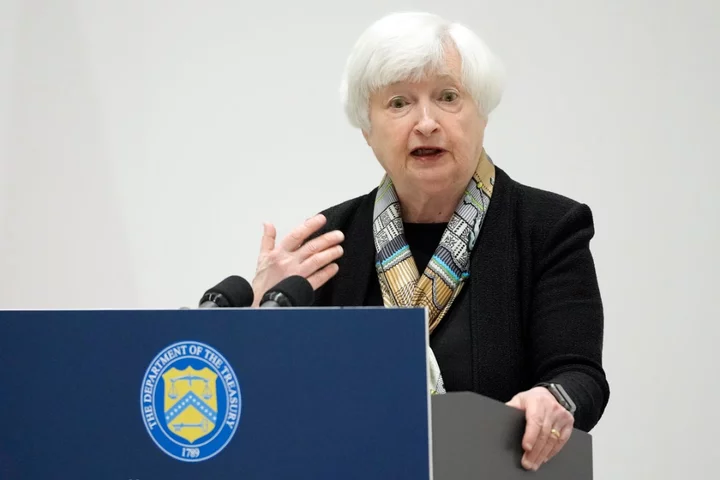
Deadline looming, Biden and McCarthy narrow in on budget deal to lift debt ceiling
Days from a deadline, President Joe Biden and House Speaker Kevin McCarthy are narrowing in on a two-year budget deal aiming to curb federal deficits in exchange for lifting the nation's debt ceiling and staving off an economically devastating government default. The Democratic president and Republican speaker hope to strike a budget compromise this weekend. With Republicans driving for steep cuts, the two sides have been unable to agree to spending levels for 2024 and 2025. Any deal would need to be a political compromise, with support from both Democrats and Republicans to pass the divided Congress. But the budget flow isn't the only hang-up. A person familiar with the talks said the two sides are “dug in” on whether or not to agree to Republican demands to impose stiffer work requirements on people who receive government food stamps, cash assistance and health care aid, some of the most vulnerable Americans. Yet both Biden and McCarthy expressed optimism heading into the weekend that the gulf between their positions could be bridged. A two-year deal would raise the debt limit for that time, past the 2024 presidential election. “We knew this would not be easy," McCarthy, R-Calif., said as he left the Capitol for the evening Thursday. McCarthy said, "It’s hard, but we’re working and we’re going to continue to work until we get this done.” House Republicans have pushed the issue to the brink, displaying risky political bravado in leaving town for the Memorial Day holiday. The U.S. could face an unprecedented default as soon as June 1, hurling the global economy into chaos. In remarks at the White House, Biden said, “It’s about competing versions of America.” “The only way to move forward is with a bipartisan agreement,” Biden said Thursday. “And I believe we’ll come to an agreement that allows us to move forward and protects the hardworking Americans of this country.” Lawmakers are tentatively not expected back at work until Tuesday, just two days from the early June deadline when Treasury Secretary Janet Yellen has said the U.S. could start running out of cash to pay its bills and face a federal default. Biden will also be away this weekend, departing Friday for the presidential retreat at Camp David, Maryland, and Sunday for his home in Wilmington, Delaware. The Senate is on recess and will be until after Memorial Day. Meanwhile, Fitch Ratings agency placed the United States’ AAA credit on “ratings watch negative,” warning of a possible downgrade. Weeks of negotiations between Republicans and the White House have failed to produce a deal — in part because the Biden administration resisted negotiating with McCarthy over the debt limit, arguing that the country's full faith and credit should not be used as leverage to extract other partisan priorities. The White House has offered to freeze next year's 2024 spending at current levels and restrict 2025 spending, but the Republican leader says that's not enough. “We have to spend less than we spent last year. That is the starting point,” said McCarthy. One idea is to set those topline budget numbers but then add a “snap-back” provision that enforces the cuts if Congress is unable during its annual appropriations process to meet the new goals. On work requirements for the aid recipients, the White House is particularly resisting measures that would drive Americans into poverty or take their health care, said the person familiar with the talks, who was granted anonymity to describe behind-closed-door discussions. On the Republican demand to rescind money for the Internal Revenue Service, it's still an “open issue” whether the sides will compromise by allowing the funding to be pushed back into other domestic programs, the person said. Pressure is bearing down on McCarthy from the House's right flank not to give in to any deal, even if it means blowing past the June 1 deadline. “Let’s hold the line,” said Rep. Chip Roy, R-Texas, a Freedom Caucus member. McCarthy said Donald Trump, the former president who is again running for office, told him, “Make sure you get a good agreement.” Failure to raise the nation’s debt ceiling, now at $31 trillion, to pay America's already incurred bills would risk a potentially chaotic federal default. Anxious retirees and social service groups are among those already making default contingency plans. Even if negotiators strike a deal in coming days, McCarthy has promised lawmakers he will abide by the rule to post any bill for 72 hours before voting — now likely Tuesday or even Wednesday. The Democratic-held Senate has vowed to move quickly to send the package to Biden’s desk, right before next Thursday's possible deadline. In one potential development, Republicans may be easing their demand to boost defense spending, instead offering to keep it at levels the Biden administration proposed, according to another person familiar with the talks. The teams are also eyeing a proposal to boost energy transmission line development from Sen. John Hickenlooper, D-Colo., that would facilitate the buildout of an interregional power grid, according to a person familiar with that draft. Those two people were also granted anonymity to discuss the private negotiations. The White House has continued to argue that deficits can be reduced by ending tax breaks for wealthier households and some corporations, but McCarthy said he told the president as early as their February meeting that raising revenue from tax hikes was off the table. While Biden has ruled out, for now, invoking the 14th Amendment to raise the debt limit on his own, Democrats in the House announced they have all signed on to a legislative “discharge” process that would force a debt ceiling vote. But they need five Republicans to break with their party and tip the majority to set the plan forward. They are all but certain to claw back some $30 billion in unspent COVID-19 funds now that the pandemic emergency has officially been lifted. ___ Associated Press writers Chris Megerian, Josh Boak, Zeke Miller and Mary Clare Jalonick contributed to this report. Read More Ukraine war’s heaviest fight rages in east - follow live Charity boss speaks out over ‘traumatic’ encounter with royal aide US Park Police investigate attack on Australian journalists Biden releases new strategy to tackle rise in antisemitism, says 'hate will not prevail' On 3rd anniversary of George Floyd's death, Biden stops GOP-led effort to block DC police reform law
2023-05-26 12:18

BofA must face class action over 2020 benefit card fraud
By Jody Godoy Bank of America must face cardholder allegations that it bungled its response to unauthorized transactions
2023-05-26 06:59

American Airlines flags no earnings impact from NEA ruling
American Airlines Group Inc's Chief Financial Officer Devon May said on Thursday the court ruling on the Northeast
2023-05-25 23:52
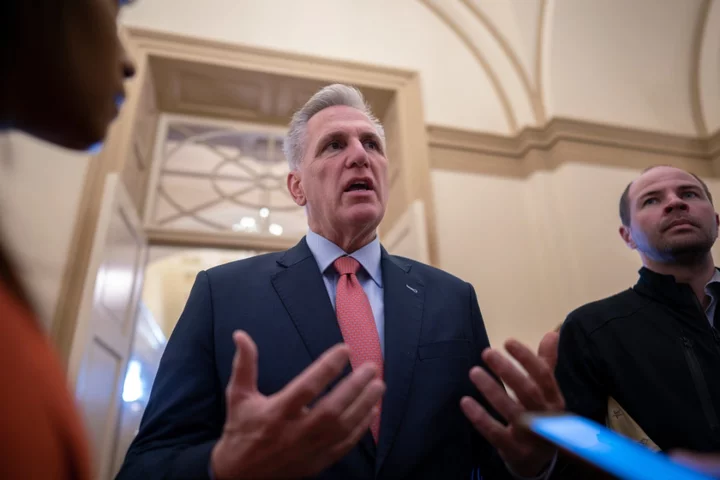
McCarthy's Republicans push debt ceiling talks to brink, lawmakers leaving town for weekend
House Republicans are pushing debt ceiling talks to the brink, displaying risky political bravado as they prepare to leave town Thursday for the holiday weekend just days before the U.S. could face an unprecedented default that could hurl the global economy into chaos. A defiant House Speaker Kevin McCarthy said the debt ceiling standoff was “not my fault” as Republican negotiators and the White House failed to finish out talks. He warned they need more time to try to reach a budget-slashing deal with President Joe Biden. But it's clear the Republican speaker — who leads a Trump-aligned party whose hard-right flank lifted him to power — is now staring down a potential crisis. Lawmakers are tentatively not expected back at work until Tuesday, just two days from June 1, when Treasury Secretary Janet Yellen has said the U.S. could start running out of cash to pay its bills and face a potentially catastrophic default. Fitch Ratings agency placed the United States’ AAA credit on “ratings watch negative,” warning of a possible downgrade because of what it called the brinkmanship and political partisanship surrounding the debate over lifting the debt ceiling. "This is a battle between extremism and common sense,” said Democratic Rep. Katherine Clark of Massachusetts, the minority whip. The Republicans, she said, "want the American people to make an impossible choice: devastating cuts or devastating debt default.” Weeks of negotiations between Republicans and the White House have failed to produce a deal — in part because the Biden administration never expected to be having to negotiate with McCarthy over the debt limit, arguing it should not be used as leverage to extract other partisan priorities. McCarthy is holding out for steep spending cuts that Republicans are demanding in exchange for their vote to raise the nation's borrowing limit. The White House has offered to freeze next year's 2024 spending at current levels, but the Republican leader says that's not enough. “We have to spend less than we spent last year. That is the starting point," said McCarthy, R-Calif. Failure to raise the nation’s debt ceiling, now at $31 trillion, would risk a potentially chaotic federal default, almost certain to inflict economic turmoil at home and abroad. Anxious retirees and social service groups are among those already making default contingency plans. Even if negotiators strike a deal in coming days, McCarthy has promised lawmakers he will abide by the rule to post any bill for 72 hours before voting — now likely Tuesday or even Wednesday. The Senate, where Democratic Majority Leader Chuck Schumer has vowed to move quickly, would also have to pass the package before it could go to Biden’s desk to be signed into law, right before next Thursday's possible deadline. The contours of a deal have been within reach for days, but Republicans are unsatisfied as they press the White House team for more. In one potential development, Republicans may be easing their demand to boost defense spending, instead offering to keep it at levels the Biden administration proposed, according to one person familiar with the talks and granted anonymity to discuss them. The Republicans may achieve their goal of of rolling back bolstered funding for the Internal Revenue Service if they agree to instead allow the White House to push that money into other domestic accounts, the person said. At the White House, press secretary Karine Jean-Pierre blamed Republicans for risking a devastating default that would hit “every single part of the country” as they demand “extreme" spending cuts that would hurt millions of Americans. She decried what the administration called a “manufactured crisis” set in motion by the GOP. The White House has continued to argue that deficits can be reduced by ending tax breaks for wealthier households and some corporations, but McCarthy said he told the president as early as their February meeting that raising revenue from tax hikes was off the table. Donald Trump, the former president who is again running for office, has encouraged Republicans to “do a default” if they don’t get the deal they want from the White House. Time is short to strike a deal. Yellen said Wednesday that “it seems almost certain” that without a deal the United States would not make it past early June without defaulting. “We are seeing some stress already in Treasury markets,” she said at a Wall Street Journal event. While Biden has ruled out, for now, invoking the 14th Amendment to raise the debt limit on his own, Democrats in the House announced they have all signed on to a legislative “discharge” process that would force a debt ceiling vote. But they need five Republicans to break with their party and tip the majority to set the plan forward. “Sign the bill!” Democrats yelled on the House floor after Republican Majority Leader Steve Scalise of Louisiana announced the holiday recess schedule. Agreement on a topline spending level is vital. It would enable McCarthy to deliver spending restraints for conservatives while not being so severe that it would chase off the Democratic votes that would be needed in the divided Congress to pass any bill. But what, if anything, Democrats would get if they agreed to deeper spending cuts than Biden's team has proposed is uncertain. McCarthy and his Republican negotiators said what the Democrats get is a debt ceiling increase — typically something both parties take responsibility for doing. “The problem is not the White House. The problem is Kevin McCarthy and the extreme Republicans,” said Rep. Pramila Jayapal, D-Wash., the chair of the progressive caucus. “They are the ones holding this economy hostage, that are putting all these cuts on the American people.” The negotiators are now also debating the duration of a 1% cap on annual spending growth going forward, with Republicans dropping their demand for a 10-year cap to six years, but the White House offering only one year, for 2025. Republicans want to beef up work requirements for government aid to recipients of food stamps, cash assistance and the Medicaid health care program that the Biden administration says would impact millions of people who depend on assistance. All sides have been eyeing the potential for the package to include a framework to ease federal regulations and speed energy project developments. They are all but certain to claw back some $30 billion in unspent COVID-19 funds now that the pandemic emergency has officially been lifted. The White House has countered by proposing to keep defense and nondefense spending flat next year, which would save $90 billion in the 2024 budget year and $1 trillion over 10 years. ___ Associated Press writers Seung Min Kim, Fatima Hussein, Kevin Freking and Darlene Superville contributed to this report. Read More Ukraine war’s heaviest fight rages in east - follow live Charity boss speaks out over ‘traumatic’ encounter with royal aide Georgia nuclear rebirth arrives 7 years late, $17B over cost Wisconsin trial over fake electors set to start just before 2024 presidential election On 1st anniversary of Uvalde, Texas, school shooting, Biden will push for more gun control
2023-05-25 12:51

Americans' outlook on retirement darkens to an 11-year low
In the latest sign of economic pessimism, Americans are growing increasingly concerned they won't be able to retire comfortably, according to a Gallup survey shared first with CNN on Wednesday.
2023-05-25 06:22

American Eagle cuts annual revenue forecast on weak apparel demand
(Reuters) -American Eagle Outfitters Inc cut its full-year revenue forecast on Wednesday, as apparel demand wavers due to still-high inflation,
2023-05-25 04:49
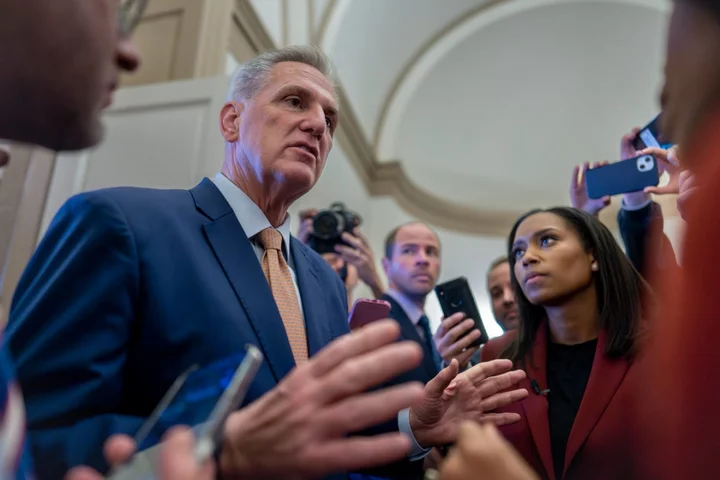
Debt ceiling talks stuck on classic problem: Republicans demand spending cuts and Democrats resist
Debt ceiling negotiations are locked on a classic problem that has vexed, divided and disrupted Washington before: Republicans led by House Speaker Kevin McCarthy want to roll back federal government spending, while President Joe Biden and other Democrats do not. Time is short to strike a deal before a deadline as soon as June 1, when the Treasury says the government risks running out of cash to pay its bills. Negotiators are expected to convene Wednesday for another round of talks as frustration mounts. The political standoff is edging the country closer to a crisis, roiling financial markets and threatening the global economy. “They’ve got to acknowledge that we’re spending too much,” said McCarthy. Cheered on by a hard-charging conservative House majority that hoisted him to power, McCarthy, R-Calif., was not swayed by a White House counter-offer to freeze spending instead. “A freeze is not going to work,” McCarthy said. The longstanding Washington debate over the size and scope of the federal government now has just days to be resolved. Failure to raise the nation's debt ceiling, now at $31 trillion, would risk a potentially chaotic federal default, almost certain to inflict economic turmoil at home and abroad. From the White House, press secretary Karine Jean-Pierre said it was “ridiculous” to suggest Biden wasn’t acting with urgency after Republicans complained about the pace. “He wants to see this done as soon as possible,” she said. Dragging into a third week, the negotiations over raising the nation's debt limit were never supposed to arrive at this point. The White House insisted early on it was unwilling to barter over the need to pay the nation’s bills, demanding that Congress simply lift the ceiling as it has done many times before with no strings attached. But the newly elected speaker visited Biden at the Oval Office in February, urging the president to come to the negotiating table on a budget package that would reduce spending and the nation’s ballooning deficits in exchange for the vote to allow future debt. “I told the president Feb. 1," McCarthy recounted. "I said, Mr. President, you’re not going to raise taxes. You've got to spend less money than was spent this year.” Negotiations are focused on finding agreement on a 2024 budget year limit. Republicans have set aside their demand to roll back spending to 2022 levels, but say that next year’s government spending must be less than it is now. But the White House instead offered to freeze spending at current 2023 numbers. “We are holding firm to the speaker’s red line,” said a top Republican negotiator, Rep. Garret Graves of Louisiana. “Which is that we will not do a deal unless it spends less money than we’re spending this year.” By sparing defense and some veterans accounts from reductions, the Republicans would shift the bulk of spending reductions to other federal programs, an approach that breaks a tradition in Congress of budget cap parity. Graves said there were still “significant gaps” between his side and the White House. Agreement on that topline spending level is vital. It would enable McCarthy to deliver spending restraints for conservatives while not being so severe that it would chase off the Democratic votes that would be needed in the divided Congress to pass any bill. But what, if anything, Democrats would get if they agreed to deeper spending cuts than Biden's team has proposed is uncertain. Asked what concessions the Republicans were willing to give, McCarthy quipped, “We’re going to raise the debt ceiling.” The White House has continued to argue that deficits can be reduced by ending tax breaks for wealthier households and some corporations, but McCarthy said he told the president at their February meeting that raising revenue from tax hikes is off the table. The negotiators are now also debating the duration of a 1% cap on annual spending growth going forward, with Republicans dropping their demand for a 10-year cap to six years, but the White House offering only one year, for 2025. Typically, the debt ceiling has been lifted for the duration of a budget deal, and in this negotiation the White House is angling for a two-year agreement that would push past the presidential elections. Past debt ceiling talks have produced budget agreements in which both parties have won some concessions in a give and take. Both have wanted to raise the debt limit to prevent a economy-shattering federal default. Graves explained the Republican position this time around. Since Biden already boosted federal spending in significant ways with his COVID-19 rescue package, Inflation Reduction Act and other bills, “they've already got theirs.” “We’re willing to give them an increase in debt ceiling. That’s what they’re getting,” he said. And yet, the Republicans are pushing additional priorities as the negotiators focus on the $100 billion-plus difference between the 2022 and 2023 spending plans as a place to cut. Republicans want to beef up work requirements for government aid to recipients of food stamps, cash assistance and the Medicaid health care program that the Biden administration says would impact millions of people who depend on assistance. All sides have been eyeing the potential for the package to include a framework to ease federal regulations and speed energy project developments. They are all but certain to claw back some $30 billion in unspent COVID-19 funds now that the pandemic emergency has officially lifted. The White House has countered by keeping defense and nondefense spending flat next year, which would save $90 billion in the 2024 budget year and $1 trillion over 10 years. The House speaker promised lawmakers he will abide by the rule to post any bill for 72 hours before voting, making any action doubtful until the weekend — just days before the potential deadline. The Senate would also have to pass the package before it could go to Biden's desk to be signed. McCarthy faces a hard-right flank in his own party that is likely to reject any deal, and that has led some Democrats to encourage Biden to resist any compromise with the Republicans and simply invoke the 14th Amendment to raise the debt ceiling on his own, an unprecedented and legally fraught action the president has resisted for now. ___ Associated Press writers Farnoush Amiri, Stephen Groves, Kevin Freking, Chris Megerian, Darlene Superville and Mary Clare Jalonick contributed to this report. Read More Ukraine war’s heaviest fight rages in east - follow live Charity boss speaks out over ‘traumatic’ encounter with royal aide Just in case: Anxious retirees, social service groups among those making default contingency plans Marjorie Taylor Greene pays $100k for chapstick used by Kevin McCarthy Debt ceiling talks grind on, but Republicans say there's a 'lack of urgency' from White House
2023-05-24 12:54
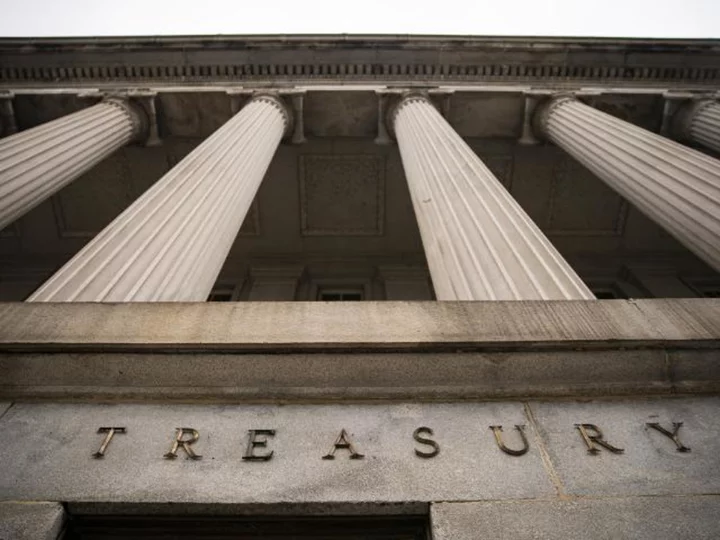
America's borrowing is its superpower. A default would tarnish that
Call it American financial exceptionalism: The full faith and credit of the US government goes far, but a default because of the debt ceiling would change that.
2023-05-24 00:15
